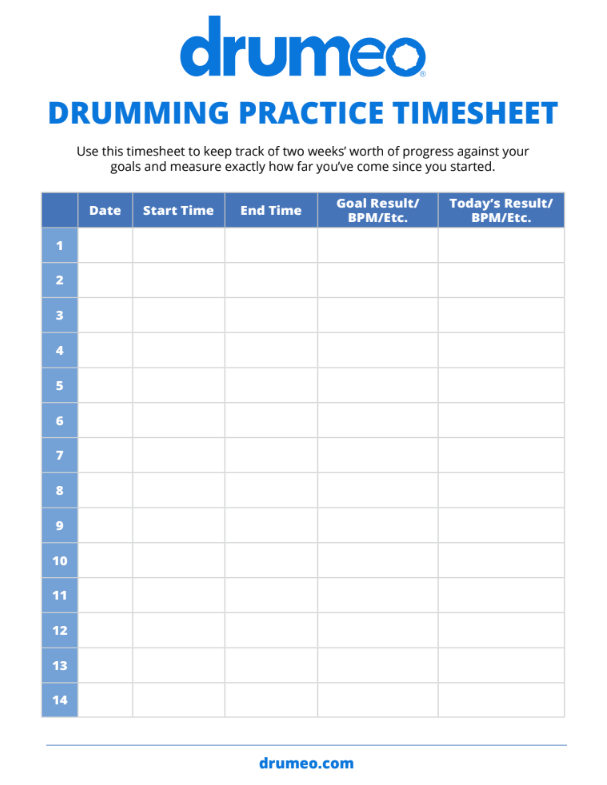
Are you a chronically unmotivated drummer? Or have you just been feeling uninspired lately? Does getting off the couch and onto the throne feel like a chore? Or have you not practiced in a while and now getting back to the drums feels intimidating?
There’s a solution for that.
But first, you need to think about why you don’t feel like practicing. Aside from feeling mentally or physically exhausted from other variables in your life, these are a few common reasons why drummers get turned off from practicing:
You feel like you sound horrible every time you practice.
No one wants to work on things they suck at. Period. But there’s a reason you sound bad when you’re practicing (and you’ll find that out later in this article). You may also be convinced that you suck even when you don’t.
You don’t feel like you’re making progress in your playing.
Maybe you think you’ve hit a plateau, and you’ve started asking yourself, “What’s the point?” If you don’t think you’re getting better, you’ll feel like you’re putting in all this work for nothing. However, you might have been improving slowly over time, and you just haven’t noticed – or maybe you aren’t practicing in a way that’s helping you level up.
You don’t have anything specific you’re working toward.
Like those who don’t feel like they’re making progress, you might wonder what the point is in practicing because you feel like your hard work isn’t leading you anywhere. Maybe you don’t have a goal you’re working toward – like a gig, a studio session, or some other kind of project – and practicing seems like a waste of time. However, you can set your own short-term and long-term goals for your own playing that’ll get you progressing, so when an opportunity arises, you’re ready for it.
You find practice too repetitive and not fun.
Like going to the gym, if you find a routine repetitive and boring, you won’t want to go. Drumming isn’t boring, but it’s the repetition that can feel tiresome. How can you make practicing fun?
You can address all of these things with a couple of easy changes in your routine. Let’s talk about four ways you can trick yourself into practicing!
Most of us don’t enjoy doing something we aren’t good at. So when we sit down to play drums, we might naturally default to playing our favorite songs, or the exercises we’re already good at, because it makes us feel good.
But playing what we’re already good at doesn’t help us get better. It just maintains what we already know. So we need to push through the suck. And sucking can really put us in a bad mood, especially as creatives.
The quickest improvement you can make in your drumming – you can literally do it right now with no drums – is to reframe your mindset. Move away from “I don’t want to practice because I suck” and embrace the knowledge that if you aren’t sucking during practice, you aren’t challenging yourself enough.
One way to trick yourself to ‘accept the suck’ is to structure your practice time the way some managers structure their employee feedback: the compliment sandwich:
If everything is coming too easily to you, make your routine more difficult. The more you push yourself, the better of a player you’ll become. Don’t torture yourself, though – trying to run before you can walk won’t help you progress and will just lead to frustration. You need to start slow and make sure you have control in your hands or feet.
Find a tempo where you can play smoothly and relaxed, and then increase the click by a few BPM until it’s just outside of your comfort zone. Once you’ve practiced that and it’s feeling good, increase the tempo again.
Remember, all of the amazing drummers you see live or on social media have had to suck to get to where they are. Everyone struggles when they’re first learning new concepts or exercises.
If you think you aren’t progressing, and you don’t notice any payoff, you aren’t as likely to commit to a regular routine – and that’s understandable. Progress in drumming is typically slow and steady, so it might not feel like it’s happening. The best way to know for sure if you’re progressing is to keep a record of your progress and review it regularly.
One way to do this is to film and record yourself. You might do this once a week to track gradual progress, or once a practice to self-critique. Try to save the files with the calendar date in the file name.
If you’re trying to increase your speed, create a simple practice sheet with two columns: the date and the BPM you’re working on.
Documenting your playing will help you identify and visualize your progress so even if you don’t ‘feel’ like you’re improving, the numbers may tell you otherwise, and this will hopefully motivate you to keep practicing.
You should also set specific, concrete goals to give yourself something to work toward. Maybe it’s to be able to play a tricky pattern, grasp an independence challenge, or hit a difficult tempo. Feel free to reward yourself when you hit your goals – just one more thing to look forward to!

Have you ever driven for long periods of time on a prairie highway? The environment looks exactly the same for hours, and the road is perfectly straight. Your eyes, arms, and feet can get tired, and your brain might go into ‘lazy’ mode because of the lack of stimulation.
If you get bored easily, practicing the same thing over and over for long periods of time probably doesn’t sound appealing. Unfortunately, it’s something we need to do to lock in our muscle memory.
To get around this, try to diversify your routine – both within the exercise you’re working on, and between the types of exercises you’re working on.
For example, if you need to practice your double stroke technique, rather than just playing double strokes, switch to different combinations of doubles and singles, or try leading with your non-dominant hand. You’ll get to work on the same skill (and then some) but it’ll be easier to stay engaged and interested.
Make your entire practice session diverse as well. This might mean you work on different rudiments for 20 minutes, independence exercises for 20 minutes, grooves for 20 minutes, and then jam some songs at the end.
Don’t forget to write down the routine so you can go through it for a week, a few weeks, or however long it takes so you stay on track. Then change it up when you’re ready. But always come to practice with something to practice! If you sit down without a plan, you’re less likely to work on the tough stuff and you’re not as likely to play for as long.
The metronome: a blessing or a curse? Practicing to a click is one of the most important elements of a drummer’s routine. It helps you better gauge the space between notes and helps you improve your internal time, among other things.
However, repeating the same exercise for several minutes with constant beeping or clicking can get tiring – and it’s not exactly motivating. If you have trouble getting into it, you’re less likely to practice it. So the next time you need to work on something repetitive, find a song that’s at the same tempo and practice to that!
Check out jog.fm or find a Spotify workout playlist for a whole list of songs to choose from at your practice tempo. Take it a step further and put together your own playlist. Practicing a groove or rudiment over a song is probably more fun than with a dry metronome.
This isn’t to say that you should completely replace the click with songs. Practicing with a metronome and clearly hearing the pulses is going to help you become a more accurate drummer – especially if you aren’t as experienced. But changing up your routine will make it more interesting.
So what do you say? Ready to give this whole practicing thing another shot?
No drummer got to where they are without putting in the work. You can get there too – and enjoy yourself at the same time!
Samantha Landa currently drums with Conquer Divide and has been featured by outlets such as Sick Drummer Magazine and DRUM! Magazine. Sam proudly endorses Mapex Drums, Sabian Cymbals, Evans Drumheads and Los Cabos Drumsticks.


By signing up you’ll also receive our ongoing free lessons and special offers. Don’t worry, we value your privacy and you can unsubscribe at any time.
We use cookies for traffic data and advertising. Cookie Policy »